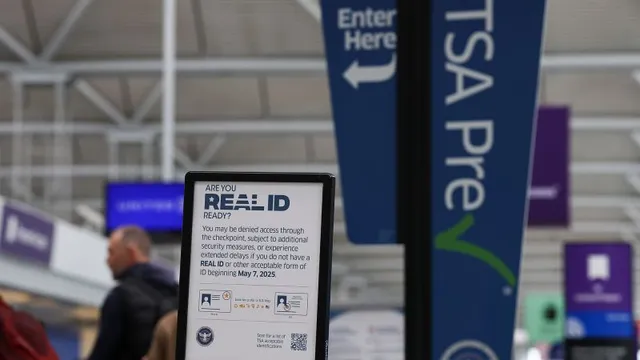
Trump administration rejects requests for REAL ID deadline extension
2025-04-30 00:00- The Trump administration has confirmed no extensions for REAL ID compliance deadlines, emphasizing the importance of enforcement.
- Kentucky lawmakers have expressed concerns over readiness and access to driver’s licensing services ahead of the May 7 deadline.
- The situation reflects broader logistical challenges with potential impacts on air travel as many Americans remain non-compliant.
Express your sentiment!
Insights
In the United States, the implementation of the REAL ID Act, which was established in 2005, has faced significant resistance from various states and advocacy groups due to concerns about privacy, costs, and states' rights. As the May 7, 2025 deadline approached, Kentucky lawmakers expressed their inability to comply with the requirements, citing logistical challenges and insufficient appointments for obtaining REAL IDs. In a letter to Homeland Security Secretary Kristi Noem, Kentucky state Senate Chair Jimmy Higdon emphasized the struggles faced by residents in accessing driver’s licensing services. Despite these requests for an extension, the Trump administration has firmly stated that no exceptions will be made, confirming through the Transportation Security Administration (TSA) that all passengers will require a REAL ID or an acceptable alternative, such as a passport or military ID, to fly. The TSA highlighted that non-compliant passengers could face longer wait times or additional measures at airports starting from the deadline. In recognition of the alarm among constituents around the country, Sen. Jack Reed from Rhode Island also requested clarification on how TSA would handle the expected influx of travelers without compliant identification. Many states, including Kentucky, are facing logistical challenges ahead of the deadline, and approximately 20% of air travelers reportedly still use forms of identification that do not meet REAL ID requirements. A large number of Americans remain unaware that a REAL ID is not necessary for every situation unless they plan to fly or access certain federal locations. Confusion surrounding what the REAL ID entails has added to the urgency felt by residents attempting to comply with the law. Lawmakers from Kentucky fear that, in the absence of clear communication and outreach, many will be unprepared when enforcement begins. Nationally, this situation is compounded by a long history of pushback against the REAL ID Act from various individuals and organizations, including the American Civil Liberties Union (ACLU). As deadlines shifted over the years, states have scrambled to align with federal requirements. The current situation, as expressed by Kentucky lawmakers, reflects a culmination of ongoing tensions between state and federal legislation that may impact air travel significantly if many travelers rely on non-compliant identification.
Contexts
The REAL ID Act, enacted in May 2005, emerged as a response to the challenges of national security and identity verification in the wake of the September 11 terrorist attacks. This legislation aimed to establish minimum security standards for state-issued driver's licenses and identification cards, thus standardizing the identification process across the United States. The act mandates that all states comply with these standards if their citizens wish to use their IDs for federal purposes, such as boarding commercial flights or entering federal buildings. The legislation reflects an effort to enhance the integrity of identification documentation and mitigate the risks associated with identity fraud and terrorism. To ensure compliance with the REAL ID Act, states were required to implement a series of stringent requirements for the issuance of IDs. These requirements include verifying the authenticity of documents presented by applicants, maintaining secure databases of ID information, and limiting access to this sensitive data. States that fail to comply with these standards face penalties, including having their residents' IDs deemed invalid for federal identification purposes. In response to concerns over privacy and potential systemic issues, the Department of Homeland Security (DHS) provided several extensions and accommodations for states to meet compliance deadlines while striving to balance security needs with individual liberties. Over the years, the REAL ID Act has sparked considerable debate regarding its implications for privacy, state autonomy, and the potential for exclusion among certain populations who may struggle to obtain compliant identification. Critics have argued that the requirements disproportionately affect vulnerable groups, including the homeless and those without access to the necessary documentation. Supporters, however, emphasize the importance of a secure and reliable identification system, arguing that it strengthens national security and promotes a unified method of verifying identity. As of the current date, April 28, 2025, the implementation of the REAL ID Act continues to evolve, with an increasing number of states having achieved compliance and issued compliant IDs to their residents. Public awareness of the REAL ID requirements has grown, driven in part by deadlines for compliance communicated by DHS. Moving forward, the challenges associated with national identification policies must be navigated carefully, as officials seek to improve security while respecting the rights and needs of individuals.